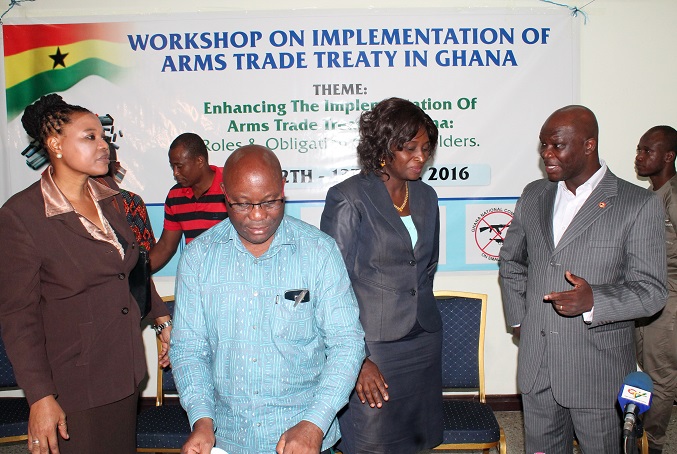
‘Implement treaty to help control proliferation of small arms’
A research assistant at the Kofi Annan International Peace-keeping Training Centre, Mrs Margaret Akakpo, has called for an effective implementation of the Arms Trade Treaty (ATT) to help control the proliferation of small arms in the country.
Advertisement
She said although the effective implementation of the ATT was not an absolute solution to the problem of proliferation of small arms and its attendant problems in the world and in Ghana, it would help in controlling the proliferation of small arms.
Mrs Akakpo was speaking at the opening of a two-day workshop organised for stakeholders in the implementation of the ATT, including government officials, civil society organisations (CSOs) and the media.
The workshop, organised by the Women’s International League for Peace and Freedom (WILPF), was on the theme: “Enhancing the implementation of the ATT in Ghana”.
It was aimed at increasing stakeholder and public awareness of the benefits of the treaty and the respective roles of all stakeholders.
What is ATT?
The ATT is a multilateral treaty that regulates the international trade in conventional weapons which was facilitated by the United Nations (UN). It entered into force on December 24, 2014.
It is a legally binding agreement which is expected to create common standards for exports, imports, transit and trans-shipment of and brokering of arms.
The treaty is an attempt to regulate the international trade in conventional weapons for the purpose of contributing to international and regional peace, reducing human suffering and promoting co-operation, transparency and responsible action by and among states.
Ghana, in August 2014, ratified the ATT, making it the 11th country in the ECOWAS bloc to endorse the treaty.
To date, 130 countries have signed it, while 86 have ratified it.
Knowing your role
Mrs Akakpo said the effective regulation of small arms was also necessary for ensuring and maintaining peace in the country, particularly during the current election season.
“We recognise the unregulated trade in conventional arms and their diversion to the illicit market to be contributory factors to armed conflicts in most countries and, therefore, all stakeholders have to collaborate with the government to end the menace,” she observed.
In her address, the President of WILPF, Dr Ayo Ayoola, said to ensure the effective implementation of the treaty, all stakeholders, including the government, CSOs and the media, needed to know their respective roles in the implementation process and execute them collectively and without compromise.
She said advocacy and raising public awareness were crucial to the successful implementation of the ATT and, therefore, appealed to the media for their support.
Stakeholder collaboration
In his contribution, the President of the West African Action Network on Small Arms and Light Weapons Ghana (WAANSA-Ghana ), Mr Ken Kinney, called on all stakeholders to effectively implement the ATT to enhance security and peace in the country.
He said the ATT was not a solution by itself to the problems of armed conflicts that plagued the world but a necessary global tool for a solution to the international problem if implemented effectively.
He said one area that should be of concern to the country was the possibility of other countries taking advantage of the socio-economic stability of Ghana to use it as a transit point for the illegal trade in arms.
Mr Kinney said although Ghana had not experienced any major election conflict since it returned to multi-party democracy, “the country could not be complacent, neither could it take its eyes from guns, ahead of the November general election, especially in view of its experience with communal conflicts”.
He said the international security situation had become complex because of globalisation, the revolution in technology and terrorism and, therefore, effective stakeholder collaboration and raising more public awareness would help prevent the damaging consequences of illicit arms in Ghana.
Writer’s email [email protected]



